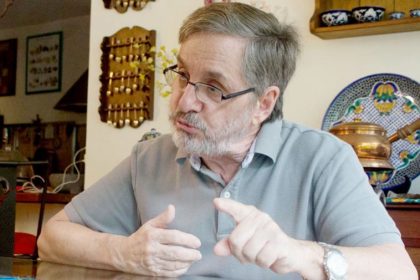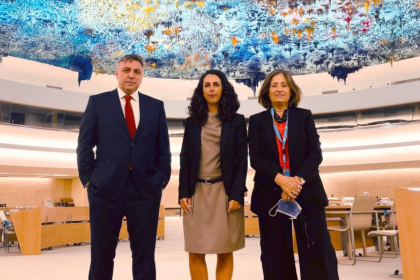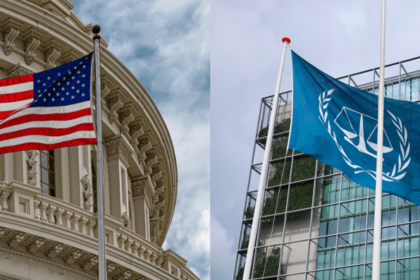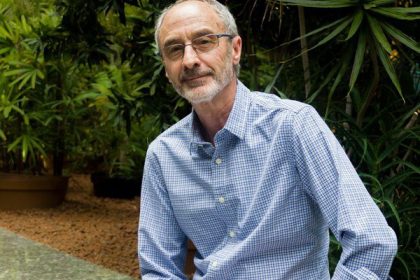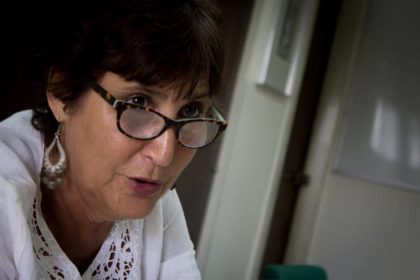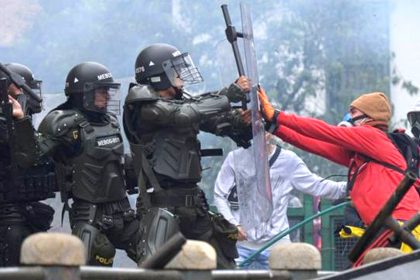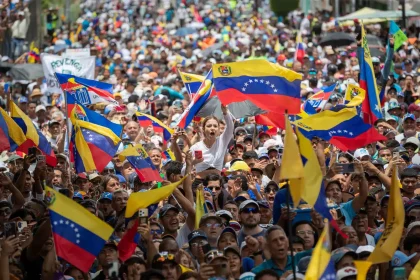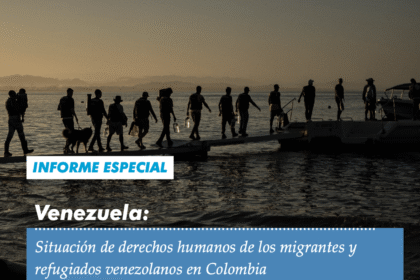
The ICC prosecutor, Fatou Bensouda, will complete her term on June 15. After the preliminary examination, she is expected to announce whether or not her office opens an investigation for crimes against humanity committed in Venezuela. Michelle Reyes Milk, a former regional coordinator for the Americas at the Coalition for the International Criminal Court, said that Venezuela’s prosecutor Tarek William Saab fails to tell the truth when he argues that the State has not been given access
The tenure of the chief prosecutor of the International Criminal Court (ICC), Fatou Bensouda, ends on June 15. On June 8, Bensouda declared that she hopes to announce whether or not she opens an investigation for crimes against humanity committed in Venezuela.
According to the prosecutor, “the matter is now awaiting the announcement of the judges and there is not much more I can say, at least at this stage.” The ICC began the preliminary examination of the Venezuela I case in 2018. This is a preliminary step that will lead to determining “whether there is a reasonable basis to proceed with an investigation following the criteria established by the Rome Statute.”
On the scope of the process and possible scenarios, the Provea-TalCual alliance interviewed Michelle Reyes Milk, a specialist in international law and professor at the Pontificia Universidad Católica del Perú.
The lawyer, who was the regional coordinator for the Americas of the Coalition for the International Criminal Court, emphasizes that regardless of whether prosecutor Bensouda issues a decision on the investigation or cedes the process to her successor, Karim Asad Ahmad Khan, it is essential to bear in mind that the key phase has already been closed. During this stage, the Prosecutor’s Office was trying to assess whether it had jurisdiction over the matter.
Also, Reyes Milk refuted the allegations of Venezuela’s Attorney General appointed by the national constituent assembly, Tarek William Saab, according to which the Venezuelan State has received discriminatory treatment at the Court. Reyes emphasized that Venezuela and its delegation in The Hague have met with the Prosecutor on more than one occasion, and records of those meetings are publicly available.
In Venezuela, expectations are high about the preliminary examination. However, the course of the process cannot be predicted
In the phase of admissibility of the preliminary examination, the Prosecutor’s Office has to determine whether there are genuine national proceedings under the principle of complementarity that allow the halt of the investigation or monitoring or, on the contrary, the national proceedings are insufficient to comply with the standard of complementarity. There is also the question of gravity that could open the door to an investigation.
As we have seen in other cases, a preliminary examination can also be concluded. This occurs when the ICC Prosecutor is convinced that the legal requirements to proceed with an investigation are met but an investigation is not open for the moment due to a matter of resource limitations.
“I think we must remain optimistic that the Prosecutor’s Office has done an important and impartial job. It has met with all stakeholders and, despite criticism by various parties, the progress has not been slow in comparison to other preliminary examinations. An average preliminary examination lasts 4 years, and some of them have extended for a few more.
Resource limitation occurred in the case of Ukraine
Three preliminary examinations have been completed this year. The court considered that the United Kingdom is taking the necessary measures to address the investigation of alleged war crimes committed in Iraq. In this case, the examination was concluded and closed. And then there are two other preliminary examinations, Nigeria and Ukraine, which were concluded because the Court found elements to proceed with an investigation but the organ lacks the resources and the capacity to continue with the process because the office has limited resources that are often under strain.
Having a preliminary examination concluded is something positive but it also raises questions from civil society: What is better? Opening an investigation that will stall due to the limitations to open new cases or having at least the preliminary examination concluded with the hope of opening an investigation when the resources are available? I want to show that having a preliminary examination concluded is not bad news. I know that we want an investigation, but the conclusion of a preliminary examination gathering the elements to move forward is also important.
Venezuela’s Attorney General, Tarek William Saab, denounced that the country has not had the right to defense and requested equal treatment and the consideration of a meeting between the parties. What do you think is sought with these actions?
It is not very clear. We know what Attorney General Saab asked for, but it is a resource that doesn’t have many precedents. It is a sort of consultation or advisory opinion that one would request to the Pre-Trial Chamber. The truth is that they want to buy some time because Prosecutor Bensouda ends her mandate on June 15. So, expectations are high as to whether the Prosecutor is going to make an announcement before the end of her mandate, and the move come as a bit of a procedural obstacle. We don’t know if Bensouda is ready to make an announcement.
From the public statements issued by the ICC prosecutor, we can tell that there has been an important advance in the preliminary examination. The key phase, in which the Prosecutor’s Office was trying to assess whether it had jurisdiction, lasted around two years and has been closed now. Many other preliminary examinations have concluded at this phase. This phase seeks to clarify whether the case deals with serious human rights violations or crimes against humanity instead. In the case of Venezuela, the Office of the Prosecutor is already convinced that they are crimes against humanity.
It is difficult to predict the answer of the Pre-Trial Chamber because this is an unconventional request; a request for suspension normally occurs once an investigation is opened, not in the preliminary examination phase, and it has been done only once. Afghanistan did so regarding an investigation that was opened last year, and the request has not even reached the Pre-Trial Chamber. In the case of Saab’s request, the move is seen as a measure to delay the process and buy time.
The Venezuelan Attorney General has also complained that the right to defense has been violated
Back in May, Attorney General Saab requested two things. He first called on the Prosecutor’s Office of the International Criminal Court to cooperate with the Venezuelan State, under the argument that “just as the State has the obligation to cooperate, the ICC Prosecutor’s Office has the obligation to cooperate with the Office of the Venezuelan prosecutor”. This must be carefully analyzed given that the legal basis for the petition, Article 93.10 of the Rome Statute, indicates that States can indeed request cooperation before the Court. However, you have to read carefully.
In the first place, that article in question states that the Court may collaborate and provide assistance to national prosecutors but this is not an obligation. Article 93.10 mentions cooperation on the basis that the State is advancing proceedings that are relevant for the Court.
However, this is not the case
That’s right. And that is what we question because the Venezuelan authorities claim that “the task of the Venezuelan State in this phase of the preliminary examination is to demonstrate that national proceedings are being conducted in order to exercise its jurisdiction over crimes that would be within the jurisdiction of the Court,” but the complementarity test required by the ICC should focus on what is the interest of the Court. The interest of the Court is bringing to trial the individuals ultimately responsible for the most serious crimes.
Some of the investigations that are being carried out at the national level at this time, for example, the case of the young man in the state of Zulia who was a victim of rape by the police or the executions of councilor Fernando Albán, Captain Rafael Acosta Arévalo, and Juan Pablo Pernalete, are not directed against middle and high ranking officials.
In this scenario, what should Venezuela do?
At this time, Venezuela has the very difficult task of demonstrating that it meets the complementarity test, unless it takes action against the individuals ultimately responsible for the most serious crimes.
Saab has also compared the handling of the Criminal Court in the case of Colombia with the treatment received by Venezuela
Venezuela and its delegation in The Hague have met with the Prosecutor’s Office on more than one occasion. This has concerned civil society. My opinion is that we should not be concerned because, in the end, Venezuela is a State party to the International Criminal Court and like any State, it has the right to meet with the Prosecutor; and the fact of seeing the Prosecutor meeting with the government should not cause us any concern either because this is how the system works. The International Criminal Court is not only a judicial body, it is also an international organization of which Venezuela is a member state.
To me, the allegation that the Prosecutor’s Office has not opened up to the Venezuelan State and government seems far from the truth given that records, documents, and pictures of those meetings are publicly available. Venezuela also alleges that the ICC has not set up a mission in the country, but several factors could explain this, including budgetary restraints; remember that we are facing a relatively recent preliminary examination that started just two years ago.
In the meantime, the pandemic has hindered all travel, and it seems to me that comparing the 17-year long preliminary examination of the situation in Colombia with the Venezuelan case is difficult.
If the prosecutor decides to open an investigation, what would be the status of the officials accused of alleged crimes against humanity?
That is a very important question. The preliminary examination phase determines whether the criteria are met for an investigation. But the process includes an analysis of the cases and the alleged perpetrators. We have seen investigations where the Court has not been able to open the cases, for example, in Georgia, and that is an issue that the Prosecutor’s Office is trying to change. A comprehensive reform has been made to the International Criminal Court and one of the most important aspects has to do with speed and the need to avoid stalled investigations or unconcluded cases.
Several factors play a role in this, including the availability of resources. Some legal tools and figures governed by the Statute could delay the process. For example, Article 18 allows for the request to suspend the process for one year. Or Article 19 stating that the admissibility of a case can be brought to question. When a case was opened against Gaddafi’s son, Saif al-Islam Gaddafi. Libya used this resource to stop the process on the grounds of a national proceeding.
After an investigation has started, can the opening of the case be delayed?
In that case, the State has to demonstrate that it is planning and actually initiating national proceedings. This means that there are legal resources that can delay the opening of a case once an investigation has started, but the investigation itself provides strong evidence that must be rebutted and requires other legal strategies.
What would be the situation of the accused officials if the examination goes into the investigation phase? Will it further isolate them from the international community?
We can verify that there has been dialogue and the intention of collaboration between the State and the ICC Prosecutor’s Office in this phase of the preliminary examination. Whether that’s enough or not, we’ll see. But, also, the reality is that the nature of that interaction could change if an investigation is opened. I believe that the State should initiate national proceedings on the matter if it wants to avoid an investigation of specific cases.
Failure to cooperate would further isolate the government and all the people involved in the crimes. We must also bear in mind that all States party to the Rome Statute have the obligation to cooperate. Therefore, not cooperating would limit the scope of action of these individuals in the sense that they would be limited in where they can move without being detained. If you really want to challenge that investigation through legal channels, you have to move from the rhetoric to concrete legal measures against middle and high-ranking officials.
Regardless of what happens with the preliminary examination, do you think that this situation has visibilized the situation of Venezuela?
Undoubtedly. Also, let’s think beyond the ICC and the mechanisms that have been activated. The UN Fact-Finding Mission, the OAS report, and the preliminary examination of the ICC Prosecutor’s Office with its annual reports are all pieces of the puzzle and the fight against impunity that feed each other. All these mechanisms reached a common finding: crimes against humanity have been committed in Venezuela. And this finding has consolidated in the last two years.
We are at a point of no return where the option of impunity is no longer possible. And this must translate into justice. The victims deserve it.
Translated by José Rafael Medina for Hearts On Venezuela and the alliance Provea-TalCual

